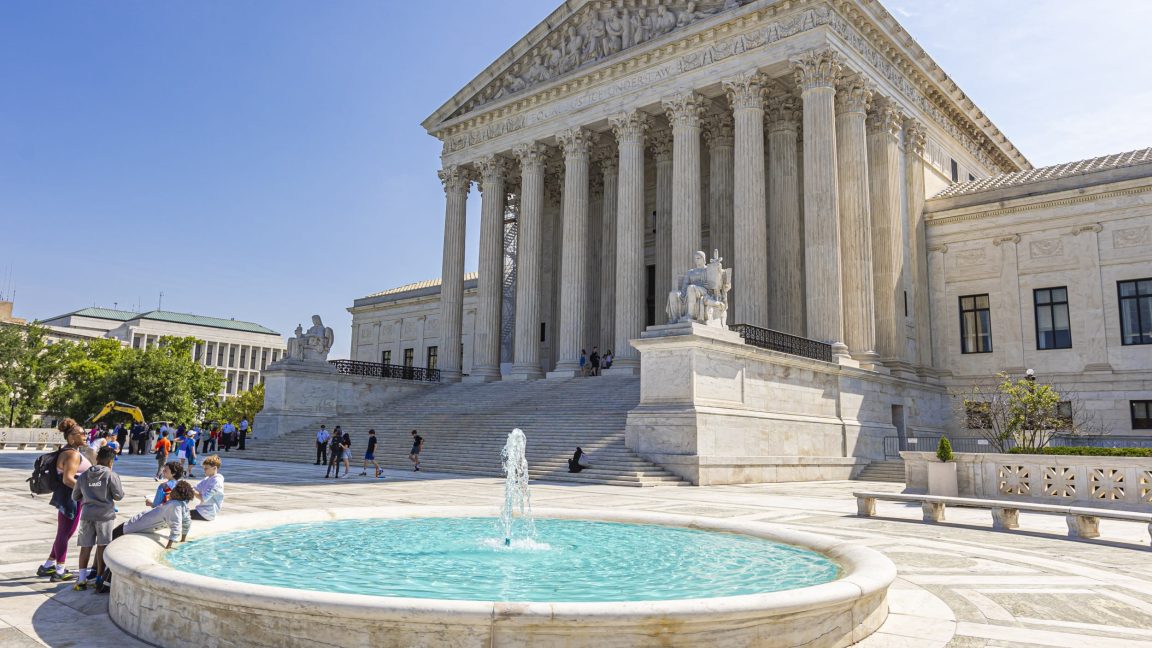
Supreme Court rejects ISPs again in latest bid to kill NYs $15 broadband law
arstechnica.com
ISPs lose, again Supreme Court rejects ISPs again in latest bid to kill NYs $15 broadband law Supreme Court not swayed by AT&T pulling home Internet service out of New York. Jon Brodkin Feb 25, 2025 12:56 pm | 39 The Supreme Court of the United States in Washington, DC, in May 2023. Credit: Getty Images | NurPhoto The Supreme Court of the United States in Washington, DC, in May 2023. Credit: Getty Images | NurPhoto Story textSizeSmallStandardLargeWidth *StandardWideLinksStandardOrange* Subscribers only Learn moreThe Supreme Court has once again rejected a telecom industry challenge to New York's $15 broadband law.The court first refused the hear the case in December, which meant that an appeals court ruling upholding the law was not disturbed. New York started enforcing the law in January, but broadband industry groups made another attempt to get the Supreme Court's attention.AT&T stopped offering its 5G home Internet service in New York entirely instead of complying with the law, and the industry hoped AT&T's exit would convince the Supreme Court to change its decision. Lobby groups filed a supplemental brief on January 17 urging the court to reconsider its denial of their petition, saying that AT&T's exit proves that "some providers will cease offering broadband service in New York rather than sell at a loss."The Supreme Court still was not swayed. In a list of orders released yesterday, the court denied the broadband industry's request for a rehearing without comment.The New York law requires ISPs with over 20,000 customers in the state to offer $15 broadband plans with download speeds of at least 25Mbps, or $20-per-month service with 200Mbps speeds. The plans must be offered to people who meet income-eligibility requirements.ISPs fear laws in more statesAs we wrote yesterday, New York's court victory over the telecom industry has inspired lawmakers in Vermont, Massachusetts, and California to propose similar laws. ISPs are afraid that many states will require cheap plans for people with low incomes.New York won its case in part because telecom lobby groups were able to get Federal Communications Commission regulation of the industry thrown out in court. Judges have made it clear that states have more power to impose requirements on broadband providers when the FCC isn't regulating ISPs as common carriers."To broadband ISPs and their friends complaining about the New York law and proposed Massachusetts laws mandating a low-income broadband service offering: you asked for complete deregulation at the federal level and you got it. This is the consequence," Gigi Sohn, executive director of the American Association for Public Broadband, wrote today.Sohn called on ISPs to join with consumer advocates to support a federal law guaranteeing "limited but meaningful oversight over broadband... Until then, my colleagues and I will go to every state that will listen to ensure that Internet users are protected from anticompetitive and anticonsumer practices."AT&T exit has limited significanceAT&T's partial exit from New York likely doesn't indicate that there will be a rush of ISPs fleeing the state. AT&T still offers mobile service in New York, and it only offered the 5G home Internet plan in 10 cities and towns. AT&T would have a much more difficult time pulling home Internet service out of the 21 states where it offers wired Internet service.The lobby groups that tried to overturn the state law are the New York State Telecommunications Association, CTIA-The Wireless Association, NTCA-The Rural Broadband Association, USTelecom, ACA Connects-America's Communications Association, and the Satellite Broadcasting and Communications Association.The groups convinced a federal judge to block the New York law in 2021, but that judge's ruling was reversed by the US Court of Appeals for the 2nd Circuit in April 2024. Appeals court judges rejected arguments that the New York law was preempted by federal rules, saying that "a federal agency cannot exclude states from regulating in an area where the agency itself lacks regulatory authority."The FCC lacked authority over broadband after the 2017 repeal of net neutrality rules and related common-carrier regulations. The Biden-era FCC voted to restore that authority but lost a court case brought by USTelecom and the Ohio Telecom Association.Jon BrodkinSenior IT ReporterJon BrodkinSenior IT Reporter Jon is a Senior IT Reporter for Ars Technica. He covers the telecom industry, Federal Communications Commission rulemakings, broadband consumer affairs, court cases, and government regulation of the tech industry. 39 Comments
0 التعليقات
·0 المشاركات
·42 مشاهدة


